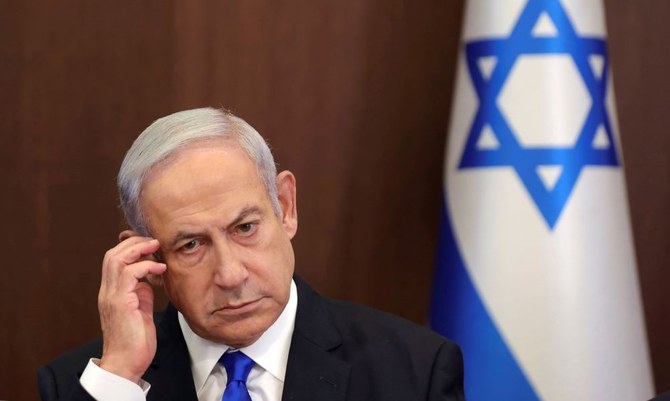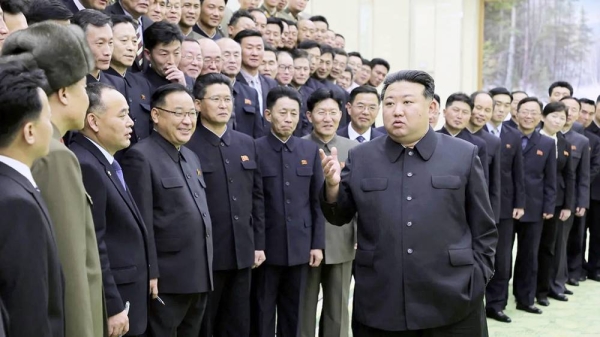
Almost a year after the calamitous events of Oct. 7, Israeli Prime Minister Benjamin Netanyahu is finally getting what he always wanted: an all-out regional war. Make no mistake, the dangerous escalation on Israel’s northern front can only be described as a full-fledged war, with all cards laid on the table. Forget about the tactical euphemisms, it is everything short of an open war. The reality is that Israel is hitting Hezbollah all over Lebanon, from the south to the Bekaa and from the Lebanese coast to Beirut’s southern suburbs.
In return, a badly injured and humiliated Hezbollah is trying to salvage its reputation and ability to respond. It is now firing missiles deep into northern Israel, as well as the suburbs of Tel Aviv. No one knows how far the two parties will go in this latest exchange of blows.
There are multiple factors in play as this bloody round unfolds. Israel has hit southern Lebanon hard right after carrying out a series of “below the belt” blows to the pro-Iran militia. As far as one can tell, Hezbollah has suffered critical losses to its top military leadership, has lost confidence in the integrity of its command and control communication system and has suffered severe blows to its underground missile bases in southern Lebanon.
The Israeli reaction has been astounding. It has proved to be precise, superior in terms of military intelligence and capable of neutralizing most of Hezbollah’s primary and most-feared first-salvo response.
Israel is bent on creating a buffer zone in southern Lebanon that extends way north of the Litani River
Osama Al-Sharif
The foremost goal of Israel’s military operation against Hezbollah is to force the Shiite group’s hand into accepting the delinking of its support of the Gaza resistance. In his most recent TV speech, Hezbollah Secretary-General Hassan Nasrallah vowed to maintain that link at any price. The Israeli operation ostensibly seeks to convince him to drop that demand, accept a truce and allow thousands of Israelis to return to their homes in northern Israel.
While a shaken Nasrallah ponders this offer, Israel is bent on creating a buffer zone in southern Lebanon that extends way north of the Litani River. It is using a Gaza-like carpet bombing of south Lebanon, causing tens of thousands of Lebanese to flee. A week or more of the Israeli bombing of south Lebanon will render this area a parched and empty space. There is no way that Hezbollah can reclaim this territory.
Netanyahu has managed to turn the Oct. 7 Hamas attacks into an existential war for Israel’s survival. He has managed to use the multiple war fronts against Israel in a battle for its survival. However, there is another goal that Netanyahu and his far-right coalition partners want to achieve: proving that resistance is futile. Israel’s enemies will be crushed.
More than 11 months of war on Gaza has decimated the Palestinian enclave. More than 70 percent of the civilian infrastructure has been destroyed. More than 41,000 Palestinians, mostly women and children, have been killed. More than 1.9 million Palestinians in Gaza are cramped into a 40 sq. mile area. It is no longer about Hamas, but about the fate of almost all Gaza residents.
Netanyahu was never interested in the fate of the Israeli captives. He wanted to destroy Hamas, which he almost did while pushing for a master plan: Occupy most of Gaza and force the Palestinians to Egypt’s borders, while allowing his extremist partners to terrorize Palestinians in the West Bank.
Aside from his legal ordeals, Netanyahu has always believed that he has a mission to debunk any attempt to create a Palestinian state. In later years, he thought that he could carry out such a scheme with the help of extremist coalition partners.
The reality today underlines Israel’s far-right plan to annex most of the West Bank, leaving the Palestinians in ghettos with limited self-administration.
Netanyahu’s war on Gaza and now Lebanon aims to show that Israel today is the most formidable regional power. All others must take note.
Hezbollah has been weakened, but it remains a force to be reckoned with. But Hezbollah cannot survive without Iran. And it seems that Iran will not come to Hezbollah’s rescue now. Instead, it is using its proxies in Iraq and Yemen to divert and engage Israel. An intensive Israeli attack on the Lebanese militia may subjugate it into accepting a truce.
And then we have Iran: an elusive and mercurial ally ready to pursue a political deal even if that means dispensing with its allies. Iran has regional priorities, which may mean leaving its allies to fend for themselves.
Netanyahu’s war on Gaza and now Lebanon aims to show that Israel is the most formidable regional power
Osama Al-Sharif
As for the US, the Biden White House appears to be satisfied looking on. It says it wants to contain the conflict but has decided to sit it out. Israel is in no immediate danger, while Biden would love to see Netanyahu calling for help.
Aside from saving his skin, Netanyahu hopes to neutralize any form of resistance for decades. Hamas is terminally injured in Gaza and Hezbollah soon will be as well. The rest, including the Houthis and the Iraqi militias, can be handled. That is the message Netanyahu wants to send and apply.
But then what? Israel faces two paths: one of unending wars and one of a lasting peace. Netanyahu and his partners want to emasculate their opponents. That will never happen. There will always be those who want to fight. Once this war ends, what awaits the region?
Even those who made peace with Israel now call for a just closure to the Palestinian saga. Israel will never have peace if the Palestinians are denied their liberation.
Israel may push Hezbollah to accept its terms — for now. But that will never end Israel’s fear that another round, a more brutal one, lurks around the corner.
Once this war ends, Israel will still face hard questions. What to do with more than 7 million Palestinians between the river and the sea? No Israeli pundit has come up with an answer. Neither Jordan nor Egypt will accept absorbing millions of Palestinian refugees. For them, this would be tantamount to a declaration of war.
This latest cycle of violence may well end in a partial Israeli victory. But it will prove to be a pyrrhic victory for Netanyahu. Hezbollah, like Hamas, will survive in one way or another. The threat to Israel will never disappear. The only way for Israel to survive is to make peace with the Palestinians. So far, Netanyahu has not seen this. If he overcomes the polls, he will face this solid reality.
Osama Al-Sharif is a journalist and political commentator based in Amman. X: @plato010












